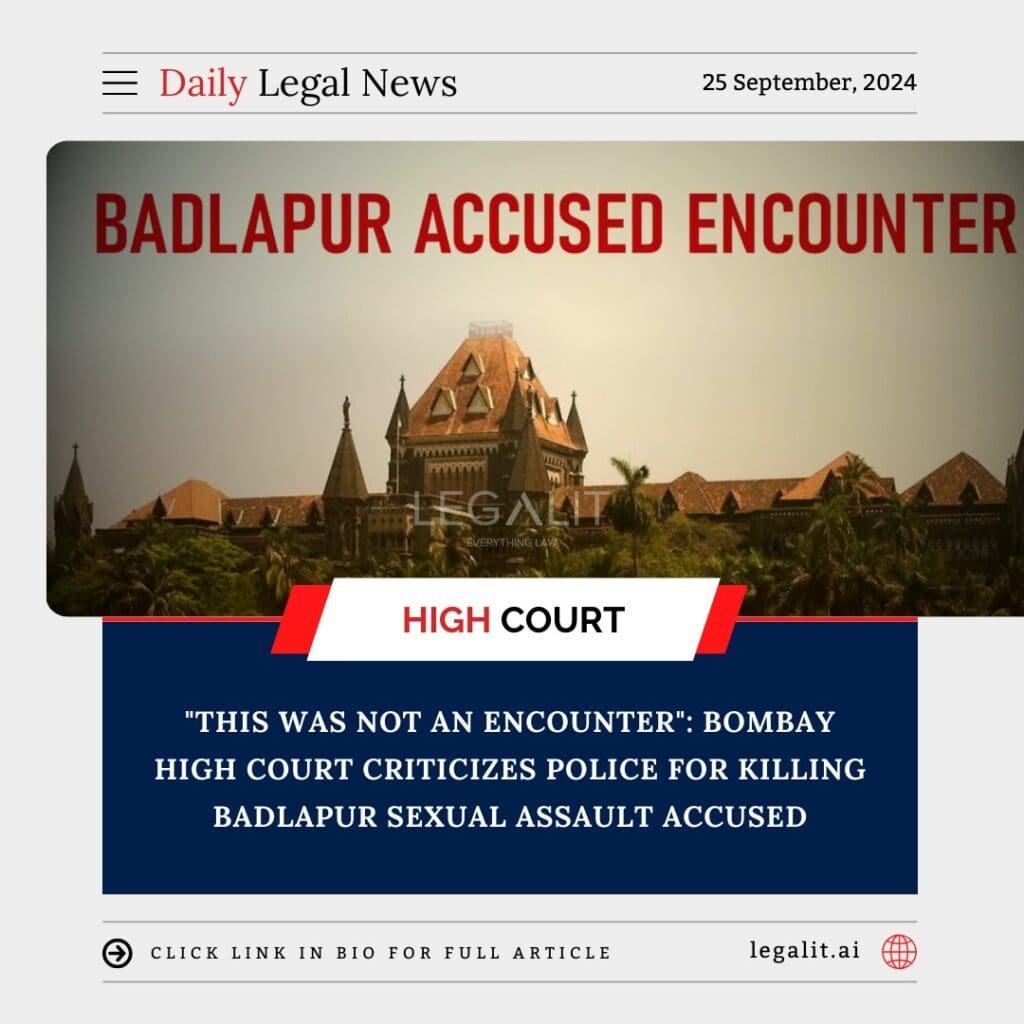
The Bombay High Court has taken serious note of the circumstances surrounding the killing of a man accused in the Badlapur sexual assault case, reprimanding the police for what appears to be a misguided encounter. The court expressed grave concerns over the incident, stating that the killing did not fit the definition of a legal or justified police encounter.
1. The Incident: A Questionable Encounter
The case stems from the killing of a man who was accused of a gruesome sexual assault in Badlapur. The police had pursued the accused, and in what they claimed to be an encounter, shot him dead. However, the High Court found the circumstances suspicious and has raised questions about the legitimacy of the encounter.
The High Court remarked that the actions of the police did not align with the established principles of law governing self-defense or justified force in police operations. While the police had initially justified the killing by claiming the accused was attempting to escape and posed a threat, the court found inconsistencies in the police’s narrative.
2. Court’s Observations: A Strong Reprimand
During the hearing, the Bombay High Court made it clear that the killing of the accused was not an act of legitimate policing. The bench highlighted that extra-judicial killings have no place in a democratic society, regardless of the severity of the crime the accused may have committed. The court stressed that every individual, including those accused of heinous crimes, is entitled to due process and a fair trial.
The High Court sternly remarked, “This was not an encounter,” indicating its belief that the police had acted outside the bounds of legal authority. The court emphasized that the role of the police is to apprehend criminals and bring them to trial, not to administer justice through violence or executions.
3. The Importance of Due Process
The court’s decision reiterates the importance of due process in India’s justice system. No matter how serious the crime, it is the role of the judiciary, not the police, to decide guilt and administer punishment. In this case, the court has underscored that vigilante justice or police acting as judge, jury, and executioner undermines the very foundation of a lawful society.
By pulling up the police for what appears to be an unjustified killing, the court reaffirmed that the rule of law must be upheld at all times. Even in cases of public outrage over sexual crimes, the police cannot bypass legal procedures in the name of public safety or swift justice.
4. Police Conduct Under Scrutiny
The High Court has now placed the conduct of the police under serious scrutiny, ordering a detailed investigation into the events that led to the killing of the accused. The court also suggested that there must be accountability for such actions, as police forces cannot operate outside the law. This case may lead to further probes into police encounters, particularly in instances where the official story is called into question.
Moreover, the court’s ruling sets an important precedent, urging law enforcement agencies across the country to adhere strictly to legal standards when dealing with accused persons, no matter the nature of their crimes.
5. Public and Legal Reactions
The incident has triggered intense public debate. Many support the police’s actions, arguing that individuals accused of sexual violence do not deserve leniency. However, legal experts and human rights advocates have welcomed the High Court’s stance, asserting that summary executions erode public trust in the justice system and pave the way for abuse of power.
The case serves as a reminder of the dangers of unchecked authority and the necessity for judicial oversight in ensuring that police actions conform to legal and constitutional norms.
6. Looking Forward: Ensuring Accountability
The High Court’s intervention in this case may lead to a broader discussion on the use of force by law enforcement and the need for reforms in **police accountability mechanisms. As the case unfolds, it will likely result in measures to ensure that due process is followed in all circumstances, no matter the pressure on law enforcement to act swiftly.
By censuring the police for this encounter killing, the Bombay High Court has reasserted the importance of legal processes and warned against the dangers of vigilantism by those entrusted to uphold the law.